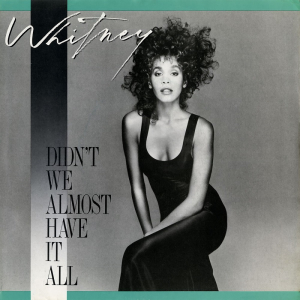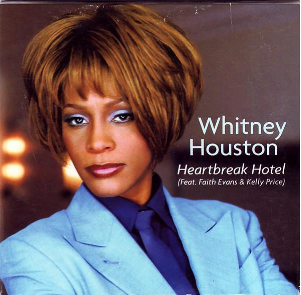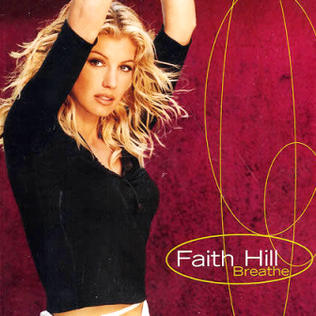
"Crazy Little Thing Called Love" is a song by the British rock band Queen. Written by Freddie Mercury in 1979, the track is included on their 1980 album The Game, and also appears on the band's compilation album, Greatest Hits in 1981. The song peaked at number two in the UK Singles Chart in 1979, and became the group's first number-one single on the Billboard Hot 100 in the US in 1980, remaining there for four consecutive weeks. It topped the Australian ARIA Charts for seven weeks.

Whitney Houston is the debut studio album by American contemporary R&B and pop singer Whitney Houston. It was released on February 14, 1985, by Arista Records. The album initially had a slow commercial response, but began getting more popular in the summer of 1985. It eventually topped the Billboard 200 for 14 weeks in 1986, generating three number-one singles — "Saving All My Love for You", "How Will I Know" and "Greatest Love of All" — on the Billboard Hot 100 chart, which made it both the first debut album and the first album by a solo female artist to produce three number-one singles. The album topped the albums charts in many countries, including Canada, Australia, Norway and Sweden, peaking at number 2 in the United Kingdom, Germany, and Switzerland. The album was certified diamond for shipments of 10 million units or more on March 16, 1999, and later 13× platinum by the Recording Industry Association of America on July 29, 1999, making it one of the top 100 best-selling albums in the United States. It has sold over 22 million copies worldwide.

My Love Is Your Love is the fourth studio album by American recording artist Whitney Houston, released worldwide on November 17, 1998. It was Houston's first studio album in eight years, following I'm Your Baby Tonight, although she had released several movie soundtracks in that time. My Love Is Your Love is composed of mid-tempo R&B, hip hop soul, pop, reggae, and torch songs, produced by musicians such as Rodney Jerkins, Soulshock & Karlin, Missy Elliott, Wyclef Jean, David Foster, and Babyface. It is notable for introducing elements of hip hop into Houston's work, only sparingly used in her previous material.

"I Will Always Love You" is a song originally written and recorded in 1973 by American singer-songwriter Dolly Parton. Her country version of the track was released in 1974 as a single and was written as a farewell to her one-time partner and mentor of seven years, Porter Wagoner, following Parton's decision to pursue a solo career.

"I Wanna Dance with Somebody " is the first single from Whitney Houston's second studio album, Whitney. It was released on April 30, 1987 by Arista Records. It was produced by Narada Michael Walden, and written by George Merrill and Shannon Rubicam, of the band Boy Meets Girl, who had previously written the number-one Whitney Houston hit "How Will I Know."

"Didn't We Almost Have It All" is the second single from Whitney Houston's second album Whitney. The song was written by Michael Masser and Will Jennings and was released on August 13, 1987. It received a Grammy nomination for Song of the Year.

"Where Do Broken Hearts Go" is the fourth single from Whitney Houston's second album, Whitney. The ballad was released on February 25, 1988. The song was written by Frank Wildhorn and Chuck Jackson and produced by Narada Michael Walden. Due to Wildhorn's previous working relationship with Arista Records CEO Clive Davis, he had been approached about potentially writing for Houston. He contacted Jackson, who came up with the title, after which Wildhorn completed the music and lyrics for the song. Smokey Robinson originally wanted to record the song; however, Wildhorn and Jackson held the song for Houston.

"I'm Your Baby Tonight" is a song recorded by American singer Whitney Houston for her third studio album of the same name in 1990. The song, written and produced by L.A. Reid and Babyface, was released by Arista Records as the lead single from the album of the same name. The single features a B-side, "Feels So Good", which has not been featured on any Whitney Houston album. While the original version, produced by L.A. Reid and Babyface, was released in the United States, the Yvonne Turner mix, was released in other countries. Houston was nominated for Best Female Pop Vocal Performance with this song at the 33rd Grammy Awards.
The Adult Contemporary chart is published weekly by Billboard magazine and lists the most popular songs on adult contemporary radio stations in the United States. The chart is compiled based on airplay data submitted to Billboard by stations that are members of the Adult Contemporary radio panel. The chart debuted in Billboard magazine on July 17, 1961. Over the years, the chart has gone under a series of name changes, being called Easy Listening(1961–1962; 1965–1979), Middle-Road Singles(1962–1964), Pop-Standard Singles(1964–1965), Hot Adult Contemporary Tracks(1979–1982) and Adult Contemporary(1983–present).

"I Have Nothing" is a song by American singer Whitney Houston, released as the third single from The Bodyguard: Original Soundtrack Album (1992) on February 20, 1993, by Arista Records. The song was written by David Foster and Linda Thompson, and produced by Foster. The song is a richly orchestrated power ballad about deep love and the confusion that happens to lovers because of the different perceptions of women and men when it comes to commitment to one's lover.

"I'm Every Woman" is the debut solo single by American singer Chaka Khan from her debut solo studio album Chaka (1978). It was Khan's first hit outside her recordings with the funk band Rufus. "I'm Every Woman" was produced by Arif Mardin and written by the successful songwriting team Nickolas Ashford and Valerie Simpson. The single established Chaka's career outside the group Rufus, whom she would leave after their eighth studio album Masterjam was released in late 1979.

"Could I Have This Kiss Forever" is a duet performed by American singer Whitney Houston and Spanish recording artist Enrique Iglesias. It was written by Diane Warren and produced by David Foster, Mark Taylor and Brian Rawling. The song first appeared on Iglesias's debut English-language album Enrique (1999) as a slow Latin-styled ballad. It was also included on Houston's first compilation album, Whitney: The Greatest Hits (2000). It achieved success on the charts of many countries, including Switzerland and the Netherlands, where it topped the charts.

"Heartbreak Hotel" is a song by American singer Whitney Houston. Originally intended to be included on TLC's third studio album FanMail, who rejected the song, it was released as the second single from Houston's 1998 album My Love Is Your Love. The song prominently features R&B singers Faith Evans and Kelly Price during the choruses and bridge.

"Breathe" is a song written by Stephanie Bentley and Holly Lamar and recorded by American country music artist Faith Hill. It was released in October 1999 as the first single from her fourth album of the same name. "Breathe" became Hill's seventh number one on the Hot Country Songs chart in the US. The song spent six weeks at number one on the Billboard Hot Country Songs chart in December 1999 and January 2000. It also peaked at number 2 on the Billboard Hot 100 chart in April 2000. Despite not peaking at number one, it was the number one single of 2000, becoming only the second single at the time to top the year end charts despite never spending a week at the top of the weekly charts and marking the first time this had happened in 35 years.
"With One Exception" is a 1967 single by David Houston. "With One Exception" was David Houston's second number one on the country charts. The single stayed at number one for a single week and spent a total of fifteen weeks on the chart.
"The Greatest Love of All" is a song written by Michael Masser, who composed the music, and Linda Creed, who wrote the lyrics. It was originally recorded in 1977 by George Benson, who made the song a substantial hit, peaking at number two on the US Hot R&B/Hip-Hop Songs chart that year, the first R&B chart top-ten hit for Arista Records. The song was written and recorded to be the main theme of the 1977 film The Greatest, a biopic of the boxer Muhammad Ali. Eight years after Benson's original recording, the song became even more well known for a version by Whitney Houston, whose 1985 cover eventually topped the charts, peaking at number one in the United States, Australia, Canada and on the US Hot R&B/Hip-Hop Songs in early 1986.
Country Airplay is a chart published weekly by Billboard magazine in the United States since January 20, 1990.













